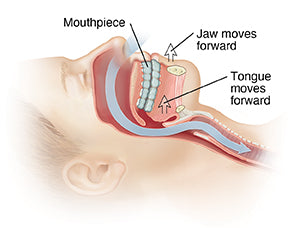Outline
Do mouthpieces work for sleep apnea?
How effective are mouth guards for sleep apnea?
Who are sleep apnea mouth guards best for?
A customer’s commend
Do mouthpieces work for sleep apnea?
Sleep apnea is a potentially serious sleep disorder that causes a person to temporarily stop breathing while they sleep. This prevents your brain from receiving enough oxygen and increases the risk of heart disease and stroke. It can also lead to excessive snoring, making you feel groggy the next day.
Some people with sleep apnea use a Continuous Positive Airway Pressure (CPAP) machine to keep your airway open while you sleep. However, if you only have mild sleep apnea, sleep apnea mouth guards can provide similar results.
A sleep apnea mouth guard is an alternative to CPAP therapy as prescribed by the Sleep Study, and many people find CPAP uncomfortable to use on a daily basis.
How effective are mouth guards for sleep apnea?
Sleep apnea is caused by the position of the throat, and mouthpieces for sleep apnea address the underlying structural factors that cause Obstructive Sleep Apnea(OSA), such as a small jaw or tongue falling into the throat. These physical features can block a person's airway and lead to sleep apnea symptoms.
Most commonly, sleep apnea mouthguards move the jaw forward, opening the airway, which makes it more difficult for the skin at the back of the throat to collapse onto the airway. Although some mouth guards will adjust the position of the tongue forward. (There are 2 different types of mouth guards for sleep apnea)

Sleep apnea mouthguards should only be worn while sleeping. They are most often recommended for people with mild or moderate OSA, although they may also improve severe OSA.
Mandibular Advancement Devices (MADs) are effective in reducing apnea and improving blood oxygen levels during sleep, but not as effective as CPAPs. however, studies have shown that MADs perform similarly to CPAPs in improving daytime sleepiness, reducing snoring, and lowering blood pressure. MADs may also reduce depressive symptoms and improve overall quality of life.
OSA treatment is only effective if it is adhered to. Some studies have shown that about half of the people treated with CPAP do not use it regularly or give it up altogether. If these people find oral appliances more tolerable and are more willing to use them, they are more likely to benefit from treatment. For some people, MADs are more comfortable and better suited for long-term use than CPAPs.
Night guards are a good solution when you have tried a PAP machine without success or have an active lifestyle. Alternatively, if your sleep apnea is not severe, then a PAP machine may be too much, so a sleep apnea mouthguard is a smarter choice.
Who are sleep apnea mouth guards best for?
The American Academy of Sleep Medicine recommends sleep apnea mouthguards for people who
- People with mild to moderate OSA
- People who snore but do not have OSA
- People with severe OSA who do not respond well to CPAP therapy or do not want to receive CPAP therapy
Some studies have shown that MAD may be particularly effective for people with low body weight and a narrow tongue or back area of the soft palate, regardless of the severity of OSA.
If you have mild to moderate sleep apnea, or if sleep apnea only occurs when you are lying on your back, a mouthguard may be very helpful for you. You may never have to try CPAP. The repositioning can clear their airways sufficiently to reduce or stop nighttime awakenings.
You are young, like to stay physically active, enjoy hiking, traveling and visiting, and simply cannot transport a PAP machine.
If this sounds like you, contact your healthcare provider and they will help determine if a sleep apnea mouth guard is right for you.
A customer’s commend:
This device, the oral insert, does work very well for me. Like most people who try it, I could not tolerate the CPAP. It went into the local trash dump (don't worry I did not pay for it, my insurance company did). I then did pay my dentist to make me a mouthpiece (my insurance would not pay for it even though it worked). It causes the lower jaw to push forward slightly and opens up my throat. There is some minor jaw discomfort but it goes away quickly. The CPAP is probably the best solution to apnea but 70% cannot tolerate it. Give the mouthpiece a try.

